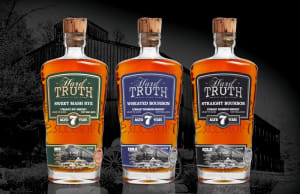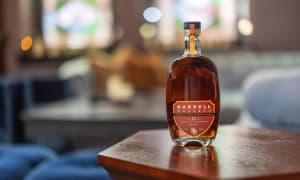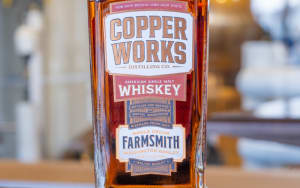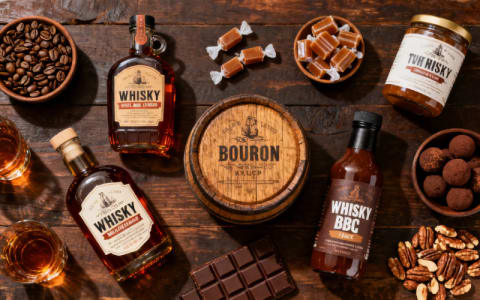On a quiet November evening in San Francisco, something happened that nobody in the bourbon world saw coming. A small family distillery from southern Indiana – the kind of place you drive past on a two-lane road without even noticing – walked away with the biggest prize in American whiskey. Starlight Distillery’s Japanese Mizunara Reserve Finished Bourbon was named Best Overall Bourbon at the 2025 San Francisco World Spirits Competition. Not best in Indiana. Not best craft bourbon. The absolute best bourbon, period – beating out every giant Kentucky name and every famous bottle you’ve ever seen on the top shelf.
The judges didn’t know whose whiskey they were tasting. Every glass is poured behind a curtain, numbers instead of labels. When the scores came in, Starlight didn’t just win – they dominated. Three “Best of Class” titles in one night. The Mizunara Reserve took home both Best Special Barrel-Finished Bourbon and the overall Best Bourbon crown. Their Single Barrel Bourbon grabbed Best Craft Distillery Whiskey. Nine medals had already come in back in April; this gala on November 8th and 9th was the knockout punch.
So what exactly is this whiskey that just embarrassed the big boys?
It starts like any respectable bourbon – corn, rye, barley, aged in new charred American oak. But then the Hubers do something most distilleries would never dare. They move the whiskey into extremely rare Japanese Mizunara oak barrels for finishing. Mizunara isn’t just expensive; it’s borderline impossible to work with. The trees grow slowly in Hokkaido, the wood is porous as hell, and coopers curse it because the staves leak like crazy. When it does cooperate, though, it gives flavors almost nobody else on the planet can get: sandalwood, coconut, hints of temple incense and green tea. Imagine drinking a bourbon that somehow smells like a Kyoto shrine at the same time it tastes like Indiana corn fields. That’s what the judges couldn’t stop scoring perfect marks for.
Ted Huber, sixth-generation master distiller, stood on that San Francisco stage still looking like a guy who spent the morning in barn boots. “At Starlight Distillery, our commitment to sustainable farming and hands-on craftsmanship has always guided us,” he said afterward. “To be named Best Overall Bourbon among the world’s finest is an extraordinary example of our family’s mission – to create spirits that reflect both place and purpose.”
His sister Dana, who runs alongside him, put it even simpler: “Our family has farmed this land for over seven generations, and every bottle tells that story. This award is proof that honest farming, patience, and passion still matter.”
That land they keep talking about? It’s the same 600-plus acres the Huber family has worked since 1804, back when Indiana was still frontier. Apples, grapes, tobacco, berries – they grew whatever paid. In 2001 they decided to turn some of that corn, wheat, and barley into whiskey. No corporate money, no famous consulting distiller flown in from Scotland. Just a father, his kids, and a couple of pot stills behind the orchard.
Most craft distilleries rush bottles out the door at four or five years old. The Hubers waited. Some of these barrels sat for eight, nine, ten years before they even thought about that Mizunara finish. While the big Kentucky plants pump out millions of cases with computers running everything, Starlight still walks the rickhouses themselves, sticking their noses in bungs the way their grandfathers did with cider barrels.
The San Francisco competition isn’t some regional county-fair contest. It’s the one that matters. Judges are national beverage directors, longtime whiskey writers, master sommeliers – people who taste thousands of spirits a year and can spot hype a mile away. To win “Best of Class” you first have to get a Double Gold, which means every single judge at the table gave it a gold medal. No ties, no mercy. Then the Best of Class winners slug it out for the top overall prizes. Starlight’s Mizunara walked through that gauntlet and never broke a sweat.
For years the story in American whiskey was simple: Kentucky makes the real stuff, everybody else is playing. Starlight just rewrote the last chapter. A farm distillery with fewer than ten employees, using grain they grew themselves, finishing in wood most distilleries have never even touched, just took home the trophy everyone chases.
Next time you’re in a liquor store staring at the usual suspects, remember what happened in San Francisco this November. Somewhere on a back road in Starlight, Indiana, the Huber family is already back at work – checking barrels, walking rows of corn, doing what seven generations taught them. And somewhere on a bar shelf near you, there’s a bottle that just proved the giants don’t always win.
Sometimes the best bourbon in the world comes from a barn.




